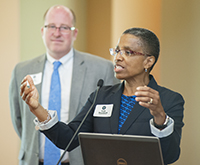
Merrifield addresses the first cohort of the College Prep Program in 2014 as Rob Wild, associate vice chancellor for students, looks on.
Leah Merrifield has had many titles but one mission: to make WashU a more welcoming place. Leah leads the College Prep Program, which recently wrapped up its second summer. She is supported by her assistant director, Courtney Brewster, and a team of Washington University students who serve as program assistants.
The free program helps high-achieving high school students with limited resources get ready for life on a college campus. Students must commit to attend three consecutive summers living on the South 40, taking courses for college credit, learning how to craft an admissions essay and preparing for the ACT. And yet, Merrifield will not measure success in college acceptance letters, but in college diplomas.
Leah sees herself in these scholars. She attended Chicago public schools and got good grades. But she arrived at Illinois Wesleyan University in downstate Bloomington, Illinois, without some of the requisite skills to thrive.
“I had so much to learn,” said Leah, whose parents did not attend college. “I had to learn how to ask for help. I had to learn how to actually study. I had to learn time management. Like many first-generation students, I needed help with many things when I arrived at college.”
Washington University always planned to expand College Prep after its pilot year, but the unrest made it clear just how urgent the need this program had become. The second College Prep cohort nearly doubled in size with one-third of its members coming from Ferguson or nearby north St. Louis County communities.
“My fervent hope and prayer is that St. Louis institutions are awake now,” Leah said. “I don’t kid myself. I don’t think everything will be wonderful with rainbows and unicorns, but perhaps institutions like Washington University and others will take stock and do all they can to be a force for good.
“Do I wish we had done something like this sooner? Of course. But I feel blessed to work at a place that’s willing to put its resources behind the students of this region.”
